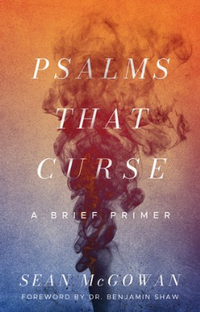 |
Psalms that Curseby Sean McGowan Kindle Edition, 90 pg. Read: November 28, 2021 |

What’s Psalms that Curse About?
Simply put:
…in our modern day some psalms have seemed to not “make the cut.” To say it another way, some would argue that not all the psalms should be sung or prayed today, particularly the ones that speak out harshly against enemies. Some popular approaches would say that these psalms were for a different time, or only to be used by the old covenant people of God. But the burden of proof rests on them to demonstrate why some of these psalms cannot be sung or prayed today, while the others can. Should the psalms that present “harsh language” and make us uncomfortable at times still be considered relevant for the church today? Should we still be able to sing, and specifically pray, these kinds of prayers today?
McGowan first sketches out the role of the Psalms and then ends with the question above, then he spends a chapter focusing on the imprecatory psalms and various views about them floating around the Church. He then focuses his attention on Psalm 137 and uses the exegesis of the psalm to establish his view on the purpose of imprecatory psalms. Then he spends a chapter on the use of them in the New Testament—or are they even compatible with a New Testament ethic? (short answer: yes)
This is short work, and the depth of each chapter reflects that—but McGowan covers the essentials in each.
Comparing This to Others
I don’t typically do books on similar topics back-to-back like this, but I saw this talked about on a couple of podcasts I listen to after I read The Morality of God in the Old Testament, and was curious about another take on it.
McGowan’s take is different from similar works I’ve read here in the past—like The Morality of God in the Old Testament and War Psalms of the Prince of Peace—he quotes the latter, labeling it “inadequate” (along with other views, he didn’t single it out). McGowan’s thesis is more straightforward and less nuanced than Beale’s (not superior or inferior, just more direct).
This is a primer—as McGowan reminds the reader—so he doesn’t spend time analyzing or critiquing differing views, he mentions them briefly to distinguish his—but the focus of this short book is on his take.
Would I have preferred analysis and critique? Seeing how his views match up against others? Yes. But I’m not going to fault a guy for writing the book he wanted to rather than the one I wanted (at least until I’m wealthy enough to act as a patron).
Besides, this gives me a chance to chew on the ideas myself.
So, what did I think about Psalms that Curse?
We are not saying that the only way to respond to intense persecution is to call down God’s vengeance. In fact, the normative response should be to pray for God to convert them…what we are arguing for is a recovery of the prayer of imprecation. We are arguing for the category. We are arguing that the prayer of imprecation should have a seat at the table, not for it to be the only thing at the table.
Hard to argue against that.
I don’t know that McGowan convinced me with his position about the—but he impressed me with the argument. It’s a short work, but he does the work. First, he established his thesis from a noteworthy example of an imprecatory psalm, and then after showing his thesis at work he tactfully and pastorally lays out how the believer ought to apply it. Hard to ask for more.
I really appreciated the chapter exegeting Psalm 137 and the concluding chapter, focusing on the way the Christian ought to pray imprecatory prayers. It was an important chapter and one that I hope many encounter. I think there’s some good overlap there with some of what Adams suggested in his work, too.
Not a perfect book, but a good one, a helpful one, and a thought-provoking one. A work that should lead the reader back to the psalter for study and reflection.

![]()

